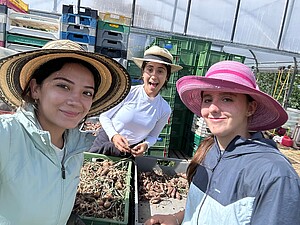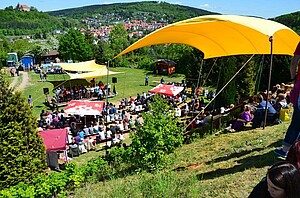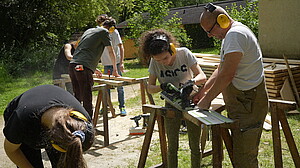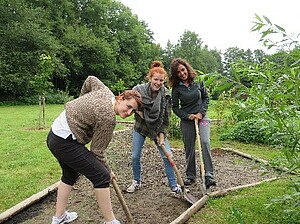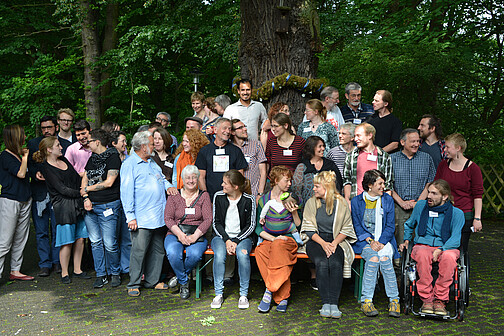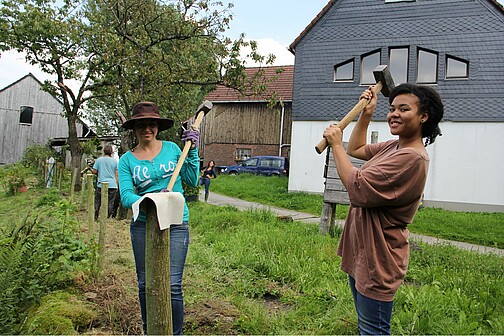
ICJA Workcamps in Deutschland
In unseren Workcamps könnt ihr euch engagieren in praktischer Friedensarbeit, im Umweltschutz und nachhaltigem Gärtnern, in Kinder und Jugendarbeit, bei Aktivitäten zugunsten der Integration benachteiligter Menschen, in der Renovierung und bei Festivals. ICJA legt Wert darauf, Workcamps zusammen mit lokalen Partnern auszurichten, die inhaltlich interessante Projekte anbieten: Initiativen und Orte, in denen vielfältige integrative, soziale und künstlerische Arbeit gemacht wird.
Die Bedingungen zu Teilnahme an Workcamps in Deutschland:
• Vermittlungsgebühr bei uns: 77,- Euro
• Reisekosten: entsprechend der Anfahrt zum Workcamp.
• Weitere Kosten fallen in der Regel nicht an oder werden in der Ausschreibung deutlich benannt
• Üblicherweise sind unsere Workcamps offen für Teilnehmende zwischen 18 und 26 Jahren, wir können Ausnahmen für Ältere machen
If you like to apply from foreign country for our workcamps, you need to apply through an organisation in your country. We can help you to find this organisation. Just send a mail to workcamps.in(at)icja.de
Die aktuellen Workcamp - Projekte im Sommer 2025 sind unten zu sehen
Zur Anmeldung
Du hast dein Workcamp bereits gefunden? Dann kannst du dich ab dem 3.März hier online mit dem Resultat deiner Suche anmelden oder hier ein Formular runterladen und uns nach dem Ausfüllen zusenden.
-
ICJA2501 Market Gardening in Tunsel 31.05. - 14.06.25
ICJA2501 Market Gardening in Tunsel 31.05. - 14.06.25
AGRI/ENVI/STUDY
Vols: 8
Age: 18-26
Language: English, German & Spanish
Project: Michels Kleinsthof is working towards the utopia of a sustainable, resilient, and grandchild-friendly agriculture becoming reality. More than 50 different crops are grown on one hectare using the “Market Gardening” principle. We are part of the movement “Community based agriculture” (in Germany, this is called “Solidarity Farming — Solidarische Landwirtschaft”). This means members are involved in the work on a weekly basis in order to bring sustainable food production to the people. School classes are allowed to experience agriculture firsthand and enjoy looking after chicken, sheep and bees.
There is a great variety of tasks in our diverse garden! Diversity makes us independent of the agricultural industries. It also benefits our fellow creatures of all kinds.
We deliver a large portion of our products to our 90 Solidarity Farming members, while another part is sold at the market in the picturesque nearby town of Staufen.
However, Michel's micro-farm sees itself not only as a food producer, but also as a place of learning and a nature conservation project! Agriculture is the number one cause of species extinction worldwide and is responsible for 25% of climate-damaging greenhouse gas emissions. On one of the most fertile soils in Germany, nestled in a beautiful spot between the Vosges and the Black Forest, the micro-farm sets a counterexample to the monocultures of the rest of the Rhine Valley.
Work: You help is needed to continue building up the farm, including construction/ renovating of a tiny house for multifunctional using, made from clay. wood, etc... Previous workcamps in 2023 and 2024 contributed to this project, and now you will have the chance to help complete it. Another manual labour will be renovating other farm facilities. Also, the farm needs a small roundabout that is stable to drive on during wet times.
In August, every garden is in the fullness of its harvest season! Tomatoes sweetened by the sun, courgettes and cucumbers growing at a fast speed and need hard-working hands and hungry mouths. But the weeds don't stop growing either. That's why there will be the opportunity to help in the daily business of Market gardening, such as harvesting, weeding, planting seeds and caring for small plants in the nursery! In other words, there will not only be the opportunity to experience multifaceted gardening firsthand, but also to master manual and physical work in a team. So, if you have extra energy, you are more than welcome!
Study part: In our work, we follow the principle of “Market Garden”: Here is what it looks like: on the smallest possible area, as many crops as possible are cultivated without the use of groundwater-damaging fertiliser, only with the help of compost. The most important idea here is recycling, in order to work with as little labour, pesticides and land as possible. Learning gardening skills, the cycle concept and environmental aspects in agriculture are therefore important learning elements during the work camp. Permaculture and biodynamic principles can be experienced here. The care and feeding of chickens and sheep can also be learned in practice. Another important part is building with natural materials. We plan to implement old craft techniques that were used to build houses and infrastructure without modern technology yet were very energy efficient.
Accommodation and food: Most of the organic seasonal food comes directly from the field to your plate. Everything else that is needed will be purchased. The diet will be predominantly vegetarian. Cooking will take place together in the outdoor kitchen and there will also be the possibility to cook a "classic" dish from your country of origin. Next to the kitchen, there is also a fireplace for sitting together in the evening, so your musical instruments are most welcome! We will also use the clay oven for pizza at least once.
As far as sleeping is concerned, we will either set up a communal tent directly on the field or provide some beds in construction trailers. A small hutch will serve as our shower, a composting toilet is already part of the sanitary facilities in the field.
Please be ready to live in very basic conditions; you will live outdoors most of the time and close to nature. The work can be physically demanding.
Region: Michels Kleinsthof is located between the Black Forest and the Vosges in the border triangle in one of the most beautiful regions of Germany. A nearby quarry pond can be easily reached after work with bicycles provided by the farm and the young, alternative and beautiful student city of Freiburg is also less than 10 minutes away by train. The farm itself is located in a small village called Tunsel, but the entire region is bursting with nature and cultural tourism opportunities. If you are travelling by plane, we would very much appreciate it if you could extend your stay in Central Europe even further, so as not to use climate-damaging mobility just for our project.
Remarks: Please bring a sleeping bag, swimwear and preferably sturdy shoes for working in the garden. Please note that you will get dirty in the garden, so clothes that can get dirty and are old are recommended. Remember that the sunshine could be strong, and you should bring suitable headgear and sufficient sun protection. Long-sleeved, thin clothing will also work for this.
The living conditions will be very simple, so please be prepared. Note that it is not recommended to attend if you are allergic to weed.
Terminal: Bad Krozingen, near Freiburg. Nearest airports: Basel, Stuttgart
Note: If you arrive at Basel airport, check whether it is free to travel through Switzerland, as you may need an additional visa there (for non-EU countries). If not, choose an airport in Germany. -
ICJA2502 Heavens Rock Spangenberg 28.06. - 19.07.2025
ICJA2502 Heavens Rock Spangenberg 28.06. - 19.07.2025
FEST/ART/KIDS/CULT
Vols: 7
Age: 18-26
Languages: English, GermanProject: The „Himmelsfels“ (Heavens rock) in Spangenberg is the territory that occupies 8 hectares. In Himmelsfels there are so-called embassies, i.e. caravans that have been modified artistically to be tiny houses for German and international guests of the Himmelsfels. Every year Himmelsfels hosts events dedicated to art, culture, Christian gospel music and youth Encounter. This summer season, there will be three international youth camps comprising about 70 – 150 young people from various countries.
The volunteers will help to enrich the current youth camps by becoming part of our international staff, by supporting the activities for the youth and the infrastructure of the camps. The program will take place on the “Himmelsfels” itself.
The “Himmelsfels” foundation is a Christian organization, which aims to develop spaces for intercultural and ecumenical exploration, as well as to motivate people for a life characterized by equality and common values. The project targets especially young people who support and are eager to join the community of Christian spirituality. For more information, please visit the website.
Work: Workcamp participants are invited to work in different fields: manual, artistically, pedagogical. During the youth camps, you will communicate with kids from diverse backgrounds and join their activities. You will support the camp in logistic areas and support the construction and decoration of an artistic project. It would be helpful to prepare in advance and offer your own workshop — whether artistic, musical, or athletic—and bring fresh and inspiring ideas. In addition, all volunteers will have the chance to introduce their countries. You should collect ideas at home and bring necessary materials for a creative presentation, including pictures, food, games, or other typical things from your countries. Further details will be provided after the placement in the workcamp. Besides the announced activities, the volunteers will also need to take responsibility by leading groups of young campers in daily works like catering and cleaning.
Study part: The study part of this workcamp will focus mostly on the question about life between past and future, tradition and modernity, small-town life and global correlations. Working at “Himmelsfels“ always encourages encounters between people from different cultures and diverse background.
Leisure part: Spangenberg is a small village in the valleys south of Kassel. You can explore local sites of interest and visit Kassel, which is famous for the international art festival Documenta.
Remarks: A letter of motivation is required! Basic knowledge of the German language is helpful to communicate with the kids. Volunteers with interest in performing arts are very welcome and it would be great if you are interested in a Christian spirituality. After registration, we will require a self-declaration regarding terms of legal protection for children and vulnerable persons. Please bring a sleeping bag. As some summer nights can get cold in Germany, please bring some warm clothes and raingear!
Accommodation: Spangenberg is a small German village that lies in the Schwalm-Eder district about 35 km southeast of Kassel. Accommodation will be basic and simple. Volunteers will sleep in caravans, sharing rooms with others.
Terminal: Melsungen train station (Melsungen Bahnhof). Nearest airport: Frankfurt/Main. Please note: Airport Frankfurt Hahn is about 150 km distance from Frankfurt.
-
ICJA2503 Making Furniture in the Forest Darmstadt 05.07. - 20.07.2025
ICJA2503 Making Furniture in the Forest Darmstadt 05.07. - 20.07.2025
CONS/MANU/ENVI
VOLS: 12
Age: 18-26
Languages: English, German
Project: Jugendhof Bessunger Forst e.V. is a non-profit children's and youth centre and one of the oldest self-managed establishments in Germany. Situated in the forest on the outskirts of the city of Darmstadt, we maintain the tradition of a place of learning and leisure close to nature and life with down-to-earth, resource-saving accommodation. For over forty years, groups of children, young people and adults, families, clubs and political initiatives have been coming together here and finding plenty of space to learn, run around, play, relax, meet, develop or simply be outdoors and be together. In spring and summer, we open the “ForstLove Café” on Sundays with a colourful musical programme. Day trippers, city travellers and fresh air fans can relax here in the green idyll of the large grounds. Our offer is aimed in particular at families and people on low incomes, as the appreciation of heterogeneity and diversity is very important to us. You can find Jugendhof on the Internet.
Work: Together we would like to build new furniture for the rooms in our guest house for children and youth groups. We will be sawing, drilling, screwing and hammering with professional tools and machines under the expert guidance of a carpenter. During your stay, there will also be other groups at the youth centre with whom you can sit around the campfire in the evening and chat.
We are delighted that a group of young people from the region with different disabilities and abilities will be part of the project. Together with the international volunteers, we are forming small teams that can support each other, learn from each other and grow together in the tasks. These mentorships enable an inclusive exchange in which everyone can contribute their individual str engths. Our aim is to create an open and respectful atmosphere in which all participants can actively take part in the work camp and gain new experiences.
Leisure time: The Jugendhof is located on the edge of the Bessunger Forest, which is easy to explore from here. On hot summer days, the shady forest offers a good opportunity to cool off and the wide-open meadows invite you to enjoy a relaxing picnic. You can enjoy meetings in a wooden yurt, which was built from an international workcamp as well. An hour's walk through the woods and meadows takes you to a beautiful bathing lake with a small sandy beach. Darmstadt is also very interesting culturally, as it was one of the centres of European Art Nouveau at the beginning of the 20th century. The “Mathildenhöhe Artists Colony” in Darmstadt has been a UNESCO World Heritage Site since 2021. We highly recommend a visit to the impressive and unique site, including the museum and the Orthodox chapel. Fancy more action? Then visit the climbing park high up in the trees with its very different levels of difficulty.
Region: Jugendhof Bessunger Forst e.V. is located on the edge of the forest between the city of Darmstadt and the village of Roßdorf. The suburban area marks the transition from the Rhine-Main region to the Odenwald low mountain range and is located 30 kilometres south of Frankfurt am Main and 50 kilometres north of the picturesque city of Heidelberg.
Accommodation: The volunteers live in our centrally located self-catering house ‘Sharewood Lodge’. In addition to a spacious kitchen and two bathrooms, there are three bedrooms in the house, each with five beds (maximum six). In general, the buildings on the extensive grounds allow for all-day outdoor living.
Remarks: After registration, we require a self-declaration in terms of legal protection for children and vulnerable persons. You will need working clothes, rainwear and, if necessary, swimming gear as well as sturdy closed shoes. Since it can get very cold in the forest at night, even in summer, please bring warm clothes and don't forget your sunscreen. Bed linen will be provided by the house. Please bring your own towels.
Terminal Bus station Bessunger Forst/Jugendhof reachable from Darmstadt Main Station or Darmstadt Ostbahnhof. Nearest Airport: Frankfurt / Main.
-
ICJA2506 Rebuilding a Dirtbike-Track in Kelkheim 26.07. - 10.08.2025
ICJA2506 Rebuilding a Dirtbike-Track in Kelkheim 26.07. - 10.08.2025
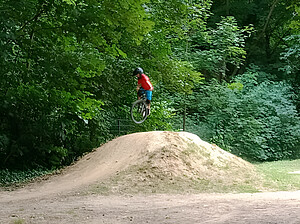
MANU/CONS
Vol: 12
Age: 18-26
Languages: English, German
Project: The city of Kelkheim (Taunus) is a small city consisting of five small villages surrounding the city center. The city stretches from the plain of the Main River to the edge of the Taunus Mountains. The landscape varies between hilly agricultural land in the south and wooded mountains in the north. Kelkheim is part of the Rhine-Main region, with major cities such as Frankfurt, Wiesbaden and Mainz nearby.
Youth work in Kelkheim is very active as local youth work in youth centres and as mobile ‘street work’. Local youth work is running three youth clubs in the center of Kelkheim and in the districts of Fischbach and Ruppertshain. The mobile youth workers are more like street workers. They approach young people on the street and try to find out where they spend their free time and what they want and need in the city. In this context, we know that many young and older people in Kelkheim like to ride bikes, especially mountain biking. So, in cooperation with the mobile youth work a flow trail in the forest of Kelkheim was built in cooperation with local teenagers.
Work: It is planned to redesign and construct a Dirtbike-Track with the help of international volunteers. The currently existing Dirtbike track was also a project involving local teenagers who participated in the construction of the track. In the last few years, the track has been worn out and now it needs to be repaired. The idea is not just to rebuild the old track, but to redesign and build something new. In this case your task would be to help us with the necessary preparatory work and to start working on the redesign of the track. This means physical labour and cooperation with workers, who are specialized in such projects.
Local teenagers and young adults will work together with you. The lead of the work will be taken by some “professional” mountain bikers who know what a good dirt bike track should look like.
Besides this practical work, volunteers will get to know the concept of youth work in Kelkheim and the integration of residents with diverse social backgrounds. A common project to shape the city can bring together different people with the same interests. In this case you will also get to know the local people and how they live in Kelkheim.
Leisure Time and Study Part: Volunteers will get free access to the local swimming pool and will visit the nearby castle of Königstein. There will be a guided tour of Kelkheim and some interesting information about the development of the first democratic institutions in Germany. Heinrich von Gagern, the most famous son of Kelkheim, was the first president of the first German national parliament in 1848. Therefore, you will also visit the historic parliament in Frankfurt itself, which is now called the “Frankfurt Paulskirche”. As there will be contact with German native speakers, the workcamp is a good opportunity to improve your German language skills.
Accommodation: Volunteers will stay in the central youth club of Kelkheim. You can use the kitchen, a pool table, a table football, a small gym for you to do some strength training and more. You will have plenty of space to make yourself at home, cook, play, do sports or watch a movie together. As already mentioned, the youth club is located in the center of Kelkheim, so you will have plenty of shopping opportunities and restaurants nearby. The central train station is only a five-to-ten-minute walk away.
Remarks: After registering, you will need to fill out a child and youth protection form. Please bring work clothes and raincoats, a sleeping bag, (you may need an isolation sheet – to be clarified), a bathing suit, music, your talents and something special from your country.
Terminal: Kelkheim Main station, near Frankfurt.
The nearest airports are Frankfurt am Main International (FRA) and Frankfurt-Hahn (HHN). Be careful, Frankfurt-Hahn Airport (HHN) is in about 150 km away from Frankfurt.
-
ICJA2507 Spend Quality Time with Asylum Seekers – Giessen 02.08. - 16.08.2025
ICJA2507 Spend Quality Time with Asylum Seekers – Giessen 02.08. - 16.08.2025
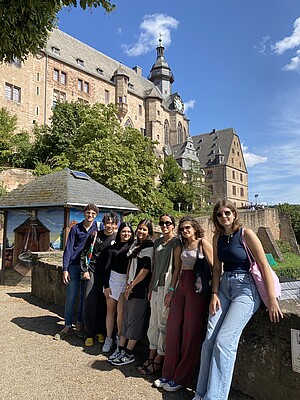
SOCI/STUDY/REFUGEE
Vol: 12
Age: 18-26
Languages: English, German
Project: Since many years now we offer this successful workcamp together with the protestant community center "Petrusgemeinde". The international volunteers are invited to the Asylum Centre for two weeks to take part in the daily life of the refugees. In the study part of the camp, we want to inform about the situation of refugees in Germany and Europe, as well as the current developments in the area of Asylum-policies. We want you to get in contact with the residents of the Asylum Centre so that we can learn about their stories, issues, difficulties and perspectives.
The Asylum Centres for asylum seekers in Hessen are located at the edge of the city Giessen. There are currently around 2 000 asylum-seekers hosted in former army barracks. The refugees are in Germany because of various reasons, e.g. political, ethnic and religious persecution or poverty. Usually, they stay at the facility for few months until a decision has been made about their application. Sometimes they are sent to other centers or to other “safe countries” where they entered the European Union, or to their countries of origin. Most of the people living in the Asylum Centres in Giessen are from Turkey, Afghanistan, Iraq, Iran, Eritrea, Ukraine and Balkan countries: young men, women, children and older people. The asylum seekers live in simple conditions and are not allowed to work or leave the district in which they live. Their permission to stay in Germany often is limited and so is their contact with the locals living in the city.Environment: Together with the refugees we want to organize common activities, where the women and children are taken into consideration: playing games, doing sports, playing music together, being creative, in short, to have some fun together… Besides organizing games for the kids and special activities for women and men, there is an option to create some scenes in a puppet theatre.
We want also to focus on several groups with special needs like people with disabilities and people from the queer community. In order to cover the needs of each group, a special collaboration is planned. For this purpose, a safe space should be created where the queer community can take part in a cooking evening and cook one dish or several small ones together in the kitchen. Game evenings are planned in the camp for people with disabilities. These ideas can be easily implemented and offer the greatest scope for getting to know each other better.
In addition, our goal is to get in contact with the young people in Giessen to raise greater awareness for the refugees and to break the isolation of the refugees. We will establish contact with institutions and voluntary and professional supporters (students, social workers, therapists) of the asylum seekers, which will help you to understand their background. In order to work with people, it is also important to know some information about how to deal with them. We therefore plan to prepare a preventative protection measure as an introduction and to attend a workshop on the topic of anti-discrimination.
We especially invite volunteers to participate who can speak Kurdish, Turkish, Arabic or Farsi, as well as volunteers who like to make music like drumming or guitar. We want to create this amazing experience where music offers a universal language for everyone.Leisure Time: There are plenty of possibilities for leisure time activities: playing football or canoeing as well as possibilities to visit some other cities. (e.g. Marburg, Frankfurt or Heidelberg).
Accommodation: The workcamp will be hosted by a local protestant church that is already involved in working with the refugees for many years. The premises of the church are plentiful, and volunteers will have a lot of space for sleeping, cooking, dining, relaxing, and for indoor and outdoor activities.
Remarks: As this workcamp can only be offered under very special conditions, we unfortunately need a whole list of additional things. We will ask for additional motivation letter in placement process and a self-declaration concerning the children and youth protection. You will need to provide a police record about good conduct as well. We will also need a proof that you are vaccinated against measles. Please bring sleeping bag, a pillow if needed, towels, camping mat, work clothes, bathing suit, music, your talents and something specific from your country.
Terminal: Giessen
-
ICJA2508 Peace Center In Sievershausen 04.08. - 18.08.2025
ICJA2508 Peace Center In Sievershausen 04.08. - 18.08.2025
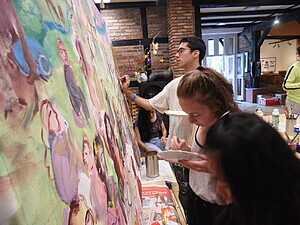
Vols: 20
Age: 18-26
Language: English, German
Project: The Peace Studies Center in Sievershausen (Antikriegswerkstatt Sievershausen) was established in the premises of the Sievershausen Lutheran Church community more than 50 years ago. During that time, the Vietnam War escalated and the Antikriegswerkstatt was part of a global movement against the war. Nowadays there are several buildings, including a guesthouse and the well-known "Anti-War House" with an assembly hall for our events, located in a park-like area along with a church older than 1000 years on the edge of the village. The peace center shows through its diverse program, that peace work has political, historical, educational and cultural aspects. Throughout the year one can visit exhibitions, readings, lectures and many cultural events. The peace education offers of the seminar area include teaching units, trainings for school classes and church groups on current and historical topics.
Manual and Creative Work: The Peace Studies Center is located on the edge of a former battlefield. An exceptionally bloody battle took place here on a Sunday afternoon in July 472 years ago. Analogous to the well-known motto "swords to ploughshares" we redesign this to "battlefields to playing fields". The participants of the work camp will continue last years’ work and design different elements of this playing field. This means manual work with wood, metal, earth and colour and some gardening. Anyone who appreciates creative work can work on a video project under expert guidance, which is to be developed on the topic of tracing peace work in Sievershausen and send messages of current peace work.
Study part: You will learn some essentials of peace work and receive basic training in non-violent conflict management by professional trainers. Moreover, the respect for Human Rights und circumstances of war and climate change is being discussed. We will visit the memorial in the former Bergen-Belsen concentration camp. There will also be a chance to learn about working with young people in a nearby youth center. Volunteers will have the opportunity to meet young people and families in the region, the group will also invite people of the village and region to an “Evening of encounter” (Abend der Begegnung) at the Peace Center.
Leisure Time: For the leisure time, the group can use facilities of the seminar house and take part in excursions to Hannover and Braunschweig.
Accommodation: The accommodation for the participants is offered in rooms with four beds each. There are bed sheets available. Food is prepared together in the kitchen of the seminar house.
Region: The Peace Center is at the verge of a village with about 2500 inhabitants. Sievershausen lies 30 kilometers east of the Lower Saxony provincial capital Hannover on the freeway to Berlin.
Terminal: Haemelerwald near Lehrte (train from Hannover to Braunschweig), 3 km from the peace center.
-
ICJA2509 Universitas in Farmhouse Gossberg 04.08. - 18.08.2025
ICJA2509 Universitas in Farmhouse Gossberg 04.08. - 18.08.2025
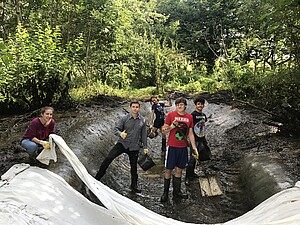
AGRI/CONS/ENVI/STUD/MANU
Vols: 12
Age: 18-26
Languages: English, German
Project: The "Universitas in Farmhouse" is place of education for nature, culture, youth work and sustainability. The aim of this project is to demonstrate different ecological cultivation methods. It is a long-standing partner of successful workcamps and a wonderful place to feel at home. Beside the topic of permaculture, the host likes to offer rooms for musicians.
Work: Volunteers are invited to continue the project GARDEN OF ENVIRONMENT – FIELDS for PLAYING AND LEARNING at our gardening land. It will offer different stations where visitors can learn and experience about nature and sustainability … very creative, surprising and funny! Volunteers will support the host in their Garden-, construction- and landscape design work. There will be physical work, using tools and working with materials like wood, rocks, soil. You will work outdoors most of the time. Last year a pond was created with the help of the volunteers! Volunteers who like to exercise can make firewood. Every year, volunteers are invited to get to know the local Perma Culture Garden and do some gardening there. While looking after the plants, there is the possibility to harvest fruits. Therefore, we are looking for 12 motivated young people who are interested in handicrafts, advanced training and gardening/landscaping.
Study part: Volunteers will get some insight in the principles of Perma Culture: how to create a productive garden which grows plants and feeds animals in a way that only a minimum input of energy and resources are required to achieve maximum sustainability to the environment? Interesting ecological and cultural projects/information from your country is very welcome.
Leisure time: The afternoons, evenings and weekends are free for personal use: sports, fieldtrips in the region and to Freiberg, swimming.
On the last Saturday, volunteers will join concert in the Farmhouse: Musician Frank Kaiser from Dresden will perform his atmospheric music. If you are talented as well, bring an instrument with you – drums and guitars can be provided.
Region: The project will take place in a famous river hill and cultural landscape in the middle of Saxony at the foot of the Erzgebirge (“Ore Mountains”), 35 km from Dresden, 15 km from Freiberg.
Accommodation: The participants are accommodated in the big seminar room. Food will be prepared together in the big kitchen of the seminar house.
Remarks: Please bring a sleeping bag with you and an isolation sheet. Gossberg is situated in a remote area; you can enjoy nature and countryside.
Terminal: Freiberg, near Dresden. Nearest airports: Berlin, Dresden, Leipzig
-
ICJA2510 FoKus Festival – RABRYKA Goerlitz 05.08. - 19.08.2025
ICJA2510 FoKus Festival – RABRYKA Goerlitz 05.08. - 19.08.2025
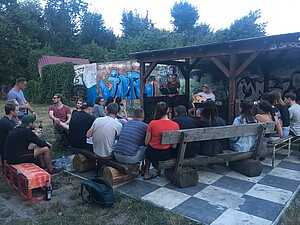
FEST/ART/MANU
Vols: 10
Age: 18-26
Languages: English, German
Project: "RABRYKA" is a unique space for youth culture and social life, situated in an abandoned factory ground. You can see it as an open space for all kinds of youth and social culture. Currently it offers a wide range of possibilities for kids, youth and adults: it unites different projects in one house, e.g. a youth club, a workshop and makerspace, intercultural or cultural education or urban gardening. There is enough inside and outdoor space for gatherings and sports, sharing things and opinions, playing music and partying together and … much more! The biggest event organized by the RABRYKA is the FOKUS Festival, in which you will also participate.
The head organisation of the RABRYKA is the “Second Attempt e.V.”, which highly motivates people to develop the civil society of Goerlitz. Everyone is invited to join meetings that focus on the vision of a society, which respects the values of tolerance, equality and cross-cultural empathy. RABRYKA is a fictional word connecting the Polish word for factory – fabryka and the first letter of red. Red are the bricks of the buildings of the former factory.
Work: Your help is needed to prepare space and facilities for the 18th Fokus Festival. An alternative 2-day festival (15th – 16th August) with several stages, many workshops, a speakers corner, food and drinks! Please watch one of the aftermovies to get an impression of the Festival. You are invited to work together in international teams, composed of employees of RABRYKA and other volunteers from Goerlitz. During working hours you can create fancy furniture for the visitors, colorful decoration for the stages and the festival area, do some gardening or lead through your own ideas. Whether you like painting, crafting, working, gardening, cooking or designing- whatever you like, we’ll find a task for you. It would be great if the group could contribute something special for the Fokus Festival, for example decorating a graffiti wall. During the festival itself volunteers will offer support by filling shifts at the bar, the backstage control or as a runner. For further information of the Festival and the Camp, please visit our Website, Instagram.
Study and leisure time: Goerlitz is situated at the very east of Germany. After WWII, it was divided and the area in the east of the river Neisse is now the autonomous town Zgorzelec and part of Poland. Volunteers will get a guided tour through Goerlitz and will learn about its eventful history. Moreover, you will learn about the current network of initiatives in the city, which offers a wide range of cultural and social work. In addition, there will be free time for a cycling tour to a lake nearby, bonfire evenings, a party and more.
Accommodation: Volunteers will stay near the youth and cultural center. The group of ICJA-volunteers will sleep in a big room with room dividers, there are bathrooms, a shower and a kitchen. Volunteers will need a sleeping bag. It is planned that volunteers will prepare dinner on their own. Breakfast and lunch will be offered at RABRYKA and will be vegan.
Remarks: Volunteers who are skilled in handicraft and creative arts, will enjoy great atmosphere to reveal their talents and abilities. Please be ready to work together in teams. Please bring a sleeping bag, a pillow (if needed), work clothes (for warm, cold and rainy days), a bathing suit, sturdy shoes and whatever you need for yourself. There is no washing mashine at RABRYKA but a laundromat 10 minutes away. After registration, we require a self-declaration concerning the children and youth protection.
Terminal: Goerlitz train station. Nearest Airports: Dresden, Berlin and Prague.
-
ICJA2511 Past, present and future for Jamlitz Railway station 09.08. - 23.08.25
ICJA2511 Past, present and future for Jamlitz Railway station 09.08. - 23.08.25

MANU/STUDY
Vols: 15
Age: 18-26
Language: English, German
Project: The “Justus Delbrück Haus” | Akademie für Mitbestimmung (Academy for Co-determination) in the Railway Station Jamlitz is an open place where everyone is welcome and can take part in events such as exhibitions, cinema evenings and other events. The organisation Karuna e.V. (Future for children and young people in need) bought the disused railway station in Jamlitz in 2008 and transformed it back into a lively place. Several organisations are now working together here, filling the past, present and future with life. You will find both a historical site rich with stories to tell and a vibrant space for exchange, where, in addition to educational programmes, leisure activities also take place. Moreover, a residential community for former homeless and decoupled young people has been established. In cooperation with the Lieberose memorial site in Jamlitz, socially disadvantaged children and young people in particular get the opportunity to escape everyday life, take advantage of artistic, historical and experiential educational programmes and experience a democratic and self-determined life. The railway station is located far away from large cities and is surrounded by forests and lakes, meadows and fields. This is very conducive to working with the young people and is part of the educational concept. “Arrive and simply be in the here and now”. This is the motto for working and living at the Railway Station Jamlitz. For further information see also Justus-Delbrück-Haus.
Work: With your help, we would like to carry out urgent work to preserve the historic railway station site. Nature is reclaiming what once belonged to it and working against memory. Together with your help and the support of the village, we want to fight against oblivion and make the station grounds visible again. The work you carry out will take place outside and is mostly horticultural: this means physical labour with hoes, saws and spades to clear the site of wild growth and bushes. Work can be physically demanding!
During the work you will have the opportunity to learn a lot about the place and to talk to the local people and hear how they perceived the different periods. The Jamlitz railway station is also run in cooperation with the nearby Lieberose Memorial in Jamlitz and the young residents are often involved in its upkeep. You can also become active at the memorial site and help to maintain the greenery and work against forgetting.
In our bicycle workshop, you can repair bicycles and take them on trips to the nearby Schwansee lake and through the meadows and forests.
Leisure and study programme: Jamlitz is situated in a very rural location and has many exciting things to offer in addition to relaxing nature, bathing lakes and a historic landscape that can be explored on foot or by bike. At the end of the 19th century, Berlin artists discovered this place and founded an artists' colony, which still characterises the identity of the village today. During the National Socialist era, a large military training area was to be built here. The project met with resistance from the local population and was never completed. However, a satellite camp of the Sachsenhausen concentration camp was built, which sadly earned the village a reputation as one of the most important sites of the Shoah in Brandenburg. After liberation from National Socialism, both the camp and the military training area continued to be used by Soviet troops. The railway station was at the centre of all these events and today bears witness to the different areas.
You will have the opportunity to get to know the history in various ways. On guided tours and seminars, through conversations with locals and explorations on your own, you can uncover and understand the overlapping layers.
We also think together about which excursions and activities can be organised. Whether a visit Cottbus or Eisenhüttenstadt or Berlin is up to you.
Accommodation: Volunteers will be accommodated in the former railway station, there are rooms with several beds, sleeping bags must be brought along. We will cook and eat together with the residents of the railway station. If you want, you can spend the night in a tent, we can set up tents for this purpose.
Remarks: Please bring a sleeping bag, possibly a pillow, towel, with you. You will need work clothes, rain gear and sturdy, closed shoes. As it can get cold at night in August, even in summer, please bring warm clothing. Don't forget sun protection in case of strong sun. For your free time, please bring a swimming costume, music, your talents and something specific from your life.
The project is in a very rural location. There is a swimming lake about 15 minutes away by bike. Volunteers should be able to cycle and swim safely.
Alcohol and drugs are not permitted in the project itself. After registration, we require a self-declaration on child and youth protection.
Terminal: Lieberose Bus station via Bahnhof Cottbus. Nearest Airport: Berlin.
-
ICJA2512 Kids and Family Centre Blomberg 16.08. – 30.08.2025
ICJA2512 Kids and Family Centre Blomberg 16.08. – 30.08.2025
MANU/ENVI/CONS/KIDS
Vols: 12
Age: 18-26
Languages: English, German
Project: Since 2009, we have successfully organized workcamps in Blomberg in cooperation with the town hall. The result has been numerous wonderful projects that have enriched our community. One of the highlights from two years ago was the successful implementation of a nature project at a local kindergarten. With the help of professional support and, of course, the enthusiastic workcamp participants, the children now have a beautiful “experience garden” where they can learn and play in nature.
Blomberg is a charming town located near Detmold in North Rhine-Westphalia, Germany. Known for its warm hospitality and friendly atmosphere, Blomberg welcomes visitors with open arms. The town is beautifully nestled in nature, surrounded by lush landscapes and scenic views, making it an ideal destination for those seeking tranquility and outdoor adventures.
Rich in history, Blomberg boasts a variety of historical sites and landmarks that reflect its cultural heritage. Visitors can explore the well-preserved medieval old town, with its picturesque half-timbered houses and the impressive Blomberg Castle. The surrounding areas also offer a wealth of historical attractions, including nearby towns that showcase the region's fascinating past.
Work: This summer, we will launch a project to enhance the outdoor area of the kindergarten in Großenmarpe, a small village close to Blomberg. One of the key features of this project will be the transformation of a construction trailer into a cozy café. With your help, we will create a meeting place for children, parents, and the entire village community. Volunteers will work together with the parents of the children and with professional workers. You will work with woodworking tools and get creative with paint.
The Großenmarpe Kindergarten and Family Centre is a facility for children aged 1 to 6 years. Our goal is to create a welcoming and engaging environment where families can come together, enjoy refreshments, and foster a sense of community.
We invite volunteers and participants to join us in this meaningful project, where we will not only beautify the outdoor space but also create a place for social interaction and connection. Together, we can make a positive impact on the lives of the children and families in Großenmarpe!
Besides this manual work, volunteers will interact with the kids. Be ready to bring some games you play in your country.
Leisure time: For your free time, we have planned a vibrant program like in previous camps, with excursions to interesting places in the region. Volunteers will participate in a workshop about rhythm in music with Hakim Ludin. He was born and raised in Afghanistan, has lived in Germany for many years, and has developed into a musician with an international reputation. He specializes in rhythms and can explain and play all kinds of global sounds with ease. For more information, see the website.
A small group of young, underage refugees live near the accommodation. They will be happy to meet international volunteers. In the past, these interactions have always been very enriching! We are looking forward to many applicants and an exciting time ahead.
Accommodation: Volunteers will live in a building in the so-called “Nederlandpark.” Accommodation includes rooms with beds and cooking facilities. Adequate sanitation facilities will be available, too. Please bring a warm blanket with you.
Remarks: As you will be in close contact with kids, we will ask you to sign a self-declaration form regarding child and youth protection. Please bring workwear and raincoats, a sleeping bag, a bathing suit, music, your talents, and something special from your country. Please bring along games you enjoyed playing as a child.
Terminal: Schieder train station. Nearest airport: Hannover
-
ICJA2513 Hands-on in Community – “Future Village” Waldhof 16.08. - 30.08.2025
ICJA2513 Hands-on in Community – “Future Village” Waldhof 16.08. - 30.08.2025

ENVI/CONS/SOCI
Vols: 12
Languages: English, GermanProject: Welcome to the Zukunftsdorf Waldhof - “Future Village”! This community, located in a former clinic site surrounded by forests, is a growing village of about 25 adults and 10 children with diverse backgrounds in fields such as therapy, medicine, IT, marketing, craftsmanship, agriculture, performing arts, education, and NGOs. Since 2019, Waldhof has been a hub of sustainability, cultural projects, and social engagement. The community follows democratic principles, fostering a participatory and cooperative way of living. For further information, see the website.
Work: Volunteers will experience life in this vibrant community while supporting various hands-on projects. You will be joining us in renovation work on our buildings and be part of this exciting "participatory construction site." Besides renovation work, volunteers will help with landscape maintenance, gardening, and preparing communal lunches alongside the residents. So, mostly it is physical work with tools used in construction sites.
Study part: Waldhof is deeply committed to sustainability and environmental education, offering an inspiring place where people and nature interact harmoniously. Volunteers will learn about sustainable community living, sociocratic principles, permaculture-based ecological gardening, care for buildings and practical landscape maintenance while engaging in meaningful work that directly contributes to the village’s growth and mission.
Environment: Zukunftsdorf Waldhof is located in a peaceful, rural setting, surrounded by forests and nature. Within 3 km range, you’ll find an old castle and a beautiful reservoir lake, perfect for walks, hiking trips, and outdoor relaxation.
Leisure Time: There will be plenty of opportunities to explore the beautiful natural surroundings, take long walks in the forest, visit the historic castle, or swim in the nearby reservoir lake. Volunteers will also be welcome to participate in community-organized activities such as fireside music, creative workshops, and social gatherings.
Accommodation & Food: Volunteers will stay in a simple mattress dormitory shared across multiple rooms. A kitchen will be available for the participants to prepare their own breakfast and dinner, while lunch will be cooked and enjoyed together with the community on weekdays and Saturdays.
Remarks: This project requires moderate to good physical fitness and a willingness to engage in hands-on work. Previous experience in construction, renovation or gardening is helpful, but not required. Volunteers should bring sturdy work clothes that can get dirty, solid shoes, and a sleeping bag.
Join us for two weeks of community living and hands-on meaningful work while experiencing the unique culture of the Zukunftsdorf Waldhof!Terminal: Katzenfurt, near Giessen, closest airport Frankfurt am Main.
-
ICJA2514 Cultural Center in Countryside Bedheim 27.09.- 11.10.25
ICJA2514 Cultural Center in Countryside Bedheim 27.09.- 11.10.25
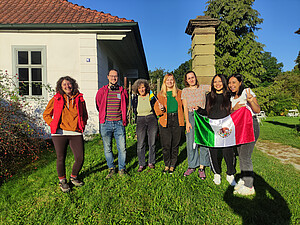
RENO/ ENVI/STUDY
Vols: 12
Age: 18-26
Language: English, German
Project: Bedheim castle was first mentioned in the year 1169 and was destroyed and reconstructed several times in its long history. During the last 30 years, the castle became a sociocultural center for this remote region. Currently it offers meeting places for social and cultural initiatives. With historical rooms, the garden café, various types of gardens and being surrounded by beautiful nature, it is a perfect place to meet with friends, to enjoy a good piece of cake or even to celebrate a wedding.
Since 1992, this association has been organizing workcamps. Volunteers enjoy spending their time to meet and work together with the inhabitants. An organic garden, a painter's studio, a goldsmith's workshop and an architect's office are the basis for the existence of the residents. There is even a small castle museum, where you can admire the bones of prehistoric dinosaurs, once living in this region. Last but not least: nice cats and dogs are waiting to be petted by the volunteers!
The aim of this project is to create an atmosphere where people with or without disabilities may come, live and work together without any prejudice against handicap, nationality, or religion.
Work: Volunteers are invited to help with the care and maintenance of this social centre and its various areas. There is work outside and inside: The meadow orchard must be cleared of bushes and, depending on the weather, apples can be collected and processed into apple juice. The work in the organic vegetable garden also depends on the weather, usually the volunteers help with the harvest of fruit and vegetables. In the castle itself, there is painting and cleaning work to be done to maintain the building. Encounters with kids and people of the region are foreseen. Overall, there is a wide variety of tasks - something for everyone!
Study: We may learn more about natural beauty of the environment. We can make excursions to places of cultural and historical interest (e.g. Weimar, the city of Goethe and the concentration camp Buchenwald). We can have discussions and lectures about German history, society, culture and politics (the German East-West border was only 9 km away from Bedheim). There will be the possibility to encounter with young people of the region and getting to know more about the countries of the participants.
Accommodation: Bedheim castle offers a simple group accommodation in a seminar house. Beds will be provided. Meals will be prepared by the group (less meat but a lot of very good vegetables and fruits from the nursery). Warm water is provided from a solar collector.
Region: Bedheim castle is located in the west of Thuringia, close to the Bavarian border. Next bigger town is Coburg (28 km away). Bedheim is surrounded by the extraordinary beautiful Franconian landscape.
Remarks: Some basic knowledge of German or English is recommended. Please bring rain and working clothes as well as swimsuits, a sleeping bag, slippers, towels and warm pullovers with you. You can also bring a map, pictures or special food items from your country.
Terminal: Bedheim is 8 km from the train station of Hildburghausen and 15 km from the train station of Bad Rodach. Nearest airports: Leipzig, Frankfurt/Main, Nuernberg.

